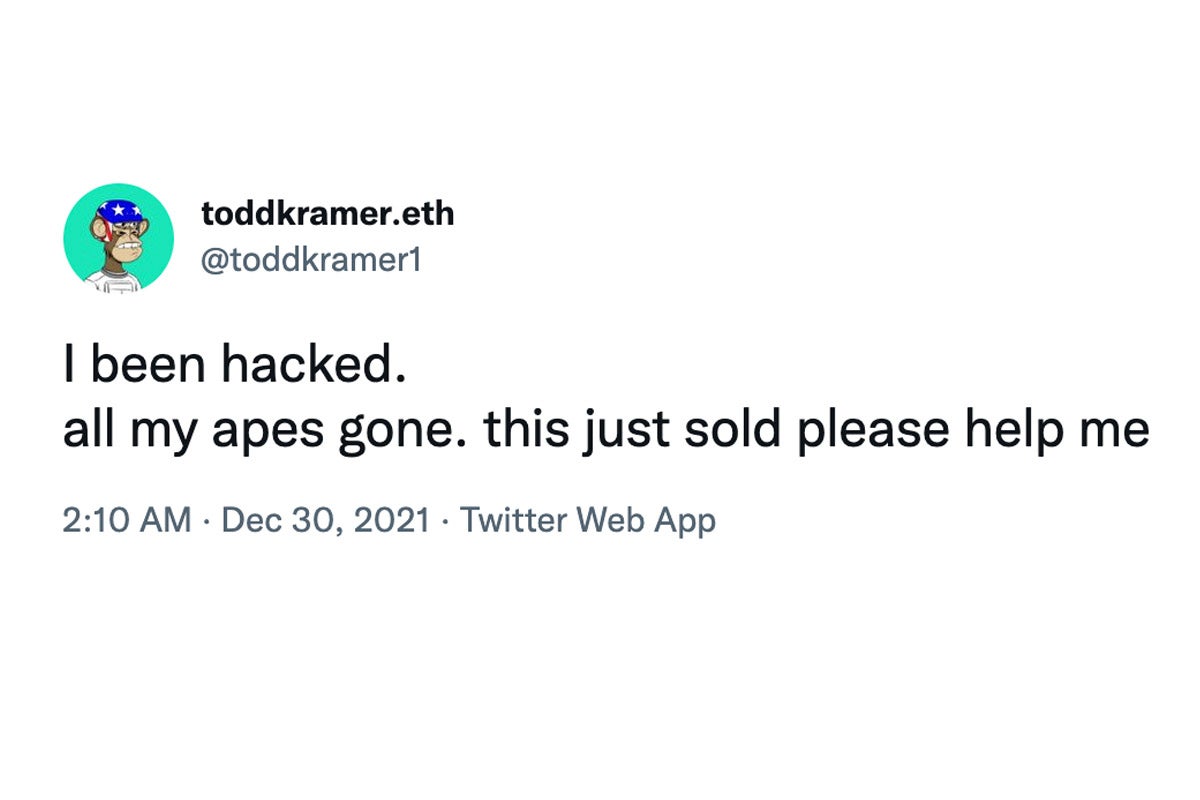This article has been updated because even more apes were stolen.
Early last year, when nonfungible tokens arose out of the crypto world to become something of a cultural phenomenon, there was nary a grinning ape in sight. But within a few months, those avatars—procedurally generated simians sporting hats and sunglasses and drawn, more or less, in the manic style of a Gorillaz video—became the face of not only NFTs, but in some ways the broader mania around cryptocurrency. Yes, Bored Ape Yacht Club avis are basically just .jpgs stored on a digital ledger, easy for anyone on the web to right-click and save. And yes, though much of the rest of the NFT market has cratered, the apes remain a status symbol, having fetched nearly $20 million just over the past week with an average price of $188,000 per ape, according the website NFT Stats.
Since April 2021, when the Bored Ape Yacht Club collective auctioned its first NFTs, large corners of Twitter and other spaces have resembled a sillier planet of the apes. Celebrities like Jimmy Fallon and Paris Hilton showed off their BAYC-created apes on national TV. Shaq made his ape his Twitter profile picture. Justin Bieber got an ape, though he probably didn’t pay for it. By now, you’ve likely heard about the strange, tragic saga of Seth Green’s apes.
In exchange for owning these ape avis, users got more than bragging rights, if they were into it. One’s ape token became their ticket to exclusive digital and IRL parties. You could get an “ApeCoin,” and use the currency to buy a special burger or purchase an expensive land deed in the metaverse.
Then came the hacks.
At the very end of 2021, a New York City–based art gallery owner named Todd Kramer posted a plea that quickly became internet-famous.

“All my apes gone” was a cri de coeur for our stupid times. How did the apes go? Well, when you purchase and trade NFTs on a digital marketplace like OpenSea, you have the option of storing your tokens—which are merely certificates denoting your virtual rights to certain images, and not the artworks themselves—in a computerized “wallet.” This can be either a “hot wallet,” i.e., an online storage space, or a “cold wallet,” which lets you keep the access codes for your tokens in a secure, offline drive. Hacks of hot wallets, through phishing emails or access gained to users’ wallet “keys,” had not been uncommon before Kramer’s situation. But his very public complaint—and fascinating choice of syntax—brought wider attention to this particular scam.
Like other true believers, Kramer has not abandoned NFTs, even as his “all my apes gone” tweet became its own token. And even though there were many more ape thefts around the same time, causing OpenSea to temporarily freeze trading, BAYC hasn’t lost its cachet. More apes in the market means more apes gone. How many apes gone? Enough that there have been multiple lawsuits filed against OpenSea and BAYC parent company Yuga Labs over the sheer scale of thievery.
I’ve assembled a lengthy, though surely incomplete, list of stolen apes and related scams. (Keep in mind that ape thefts alone are only a fraction all NFT and crypto thefts over time. It’s an expansive universe! Of scams!) Put on your internet face, whether it’s a bored ape or not, and read on.
Animation: If an NFT dealer offers to animate your apes, you probably shouldn’t listen to them.
BAYC, I hardly knew ye: Sometimes, NFTs are stolen by users impersonating other traders. In January, however, some scammers impersonated the entire BAYC network on OpenSea, with junk tokens in tow. A lotta money was lost. Then, in March, scammers impersonated BAYC founders on Twitter to drop some fake ApeCoins. These wouldn’t be the only times something like this occurred. Even Instagram wasn’t safe.
Dating apps: Not an ape swipe, but one random tweeter mocked up a convincing-looking website offering a dating service for BAYC members. It was fake.
Discord: In April of this year, as Motherboard reported, Discord channels for BAYC and other NFT networks were hacked by phishers who offered junk links to mint new NFTs in exchange for digital currencies. And no, it was not an April Fool’s prank on BAYC’s behalf.
Fr0zenBuffal0: Near the end of 2021, an NFT trader’s “Capetain” ape was stolen by a user impersonating a famed crypto figure. Much like with Kramer, his expression of frustration became its own copypasta: “This was my kids college. My mortgage. Just absolute shit that some of you out there think it’s okay that I got ripped off.”
ILovePonzi: A guy who says he loves Ponzi schemes got tricked into giving access to his NFT wallet to some bad actors back in January. Please touch him!
Jeff Nicholas: Months before Todd Kramer’s apes gone, an ordinary NFT trader named Jeff Nicholas, seeking technical support, accidentally entered a Discord channel run by hackers impersonating the identities of OpenSea staffers. As the Verge reported, once Nicholas shared his screen with them, it was all over. Six figures’ worth of tokens out the wallet—including, of course, apes.
Metaverse: In April, BAYC kickstarted an auction of virtual land deeds for its upcoming Metaverse project, Otherside (which looks like an MMORPG-style virtual universe for all types of NFT avatars, like CryptoPunks and Cool Cats). The frantic rush for these deeds made transaction fees surge to ludicrous levels and clogged the blockchain network involved, leading to a lot of wasted money—and an opportunity for scammers. Some traders moonlighted on Twitter as Otherside deed sellers, tricking users into turning to them for assistance by offering refunds or direct “links” for land deals. At the end of the rush, about $5 million of apes gone, which also made a dent in the auction prices for BAYC apes.
S27: Check out this ravishing series of words:
Seth Green: The actor and Robot Chicken creator announced at a recent NFT conference that he was debuting a new animated venture starring his very own bored ape. (You have to watch the bizarre trailer.) At least, it was going to happen until, he claimed, Twitter user @DarkWing84 stole four of his apes, including the show’s protagonist, named Fred Simian. (If Green doesn’t own the NFT, he doesn’t own any rights to make a show using Fred’s likeness.) BuzzFeed News talked to the Australian surgeon who purports to be behind @DarkWing84; he told the outlet that he believed he’d purchased the apes “in good faith” and didn’t realize the apes had been stolen from Green’s stash. As of this writing, the surgeon has refused to return the apes but has offered to get in touch with Green. Meanwhile, as long as Fred remains far from his wallets, Green’s NFT show may be in development trouble.
Spoiled Banana Society: According to the German crypto news site BTC Echo, the Discord server for BAYC and Otherside was hacked on Saturday, leading to the theft of 32 various digital tokens, including metaverse land deeds and, of course, apes. Reportedly, hackers gained control of the Discord account for BAYC community manager Boris Vagner, who runs the “Spoiled Banana Society,” an “nft fantasy football society” for BAYC members that can be accessed through the purchase of an SBS-specific token. Once Vagner’s account was taken over, the culprits launched a series of phishing attacks within the SBS and BAYC Discord servers; the victims’ apes then gone. After an hour, the SBS Twitter account stated that “We’ve got back control of the discord and Boris’s account. Thank god he didn’t delete the server. Bayc & Otherside discord was also hacked pls stay safe 🙏🏼.”
Taylor Richie: Pro tip: It’s generally recommended to trade NFTs for cryptocurrencies, and not to just swap NFTs with someone else. Should you attempt to do that, you might get screwed, as trader Taylor Richie confessed in a March blog post. (See also: S27.)
Waka Flocka: Poor Waka—the day before Todd Kramer’s apes went poof, the rapper posted a video to Twitter complaining to OpenSea about a hack to one of his wallets. Turns out, some opportunistic traders stole $19,000 worth of crypto from his wallet, after injecting some fake tokens into his collection to force a “sale.”
What have we learned? Well, if you decide you’d like to collect or sell any cartoon apes, make sure you watch out for all the potential weak spots in the system: fake accounts on every single social and trading platform, vulnerable online storage systems, sweet-talking snake-oil salespeople, issues with blockchain tech, crashes in the volatile crypto market that wipe out valuations and lead to scammers taking advantage. After all, you’re likely going to a pay a lot of money for a static ape on your computer. Still, better for that ape to be bored than gone.
Update, June 4, 2022: This article has been updated with the news of Saturday’s hack of the BAYC discord server.
